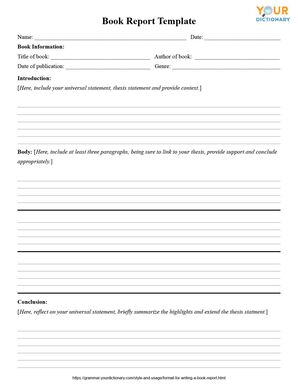

Students assigned to write a book report often ask which information should go where? What information is important, and what is not? How should I build my report so that it's easy to read, and I can earn a great grade? Following a clear, simple format for writing a book report will make important information stand out. Discover an easy-to-follow book report format and download a printable template to use as a gude.
Simple Book Report Format
There is more than one way to format a book report. If your teacher gives you a specific format to follow, use it. If not, you may want to use the basic book report outline and/or printable template below as a guide. Although there can be flexibility in designing a book report, using general formatting guidelines shows that you understand the main ideas and themes of the book.
Part 1: Introduction Paragraph
The introduction to your book report is where you lay out your basic premise and provide your all-important thesis statement. An old rule that’s still relevant is, "Tell them what you're going to tell them, tell them, then tell them what you told them." Here's the skeleton of a good intro paragraph.
- universal statement - Say something true and obvious about the book. For example, "The Adventures of Huckleberry Finn by Mark Twain is a product of its time." It’s obvious, but it lays the groundwork for how to proceed.
- thesis statement - The thesis statement is the most important part of your paper. Make a claim, something you think is true and you can support with examples from the book. For example, "Despite the language and limitations of its time, Huckleberry Finn is a powerfully anti-racist book rooted in the idea that each person's experiences are, in their own way, universal."
- context - Provide context. Write no more than five sentences about the book’s genre, author and setting. Make sure they support your thesis statement. For example, "Samuel Clemens, known by his pen name Mark Twain, was a riverboat pilot and unsuccessful businessman as well as an author. In his many careers, he encountered people and experiences beyond the usual."
Part 2: Body Paragraphs
At the middle and high-school level, most teachers typically expect a book report to have three body paragraphs. The body of the book report should describe the characters of the book, the purpose of the book and the plot. You could trace a character's experience throughout the book, analyze a motif or theme of the book, or compare one character’s experience with another's.
- link to thesis - Describe at least one specific way the book's text supports your thesis.
- supporting details - Add supporting information from the book and your interpretation of it to support your case. Quote a few specific examples from the book that support your thesis.
- closing - "Look at how well I supported my thesis!" Don't actually write that, you'll get in trouble. But that's the gist of what a closing sentence should accomplish.
Part 3: Conclusion Paragraph
The conclusion of a book report effectively conveys how the document addressed the points raised in the introduction. It should summarize important points, mention what you learned from the book, and state whether or not you would recommend it.
- reflection - This is not quite as general as the universal statement, but the reflection is close. For example, "Despite its racist language and limitations of the time, the message of Huckleberry Finn…"
- summarize highlights - Summarize the highlights of your main argument(s), sticking with just a few short, concise sentences. Think of your conclusion as the last few minutes of class; wrap this thing up so everybody can get to lunch.
- extend the thesis statement - Restate your thesis, but with an added sentence about what makes it important. For example, "By writing an anti-racist book in a deeply racist time, Mark Twain has both chronicled his own experiences and linked it with our own."
Printable Book Report Outline
If you like the general book report outline described above and want to follow it fairly closely, click the image below to download a PDF template of a book report outline that you can use as a guide to format the book report you are working on now.

Be sure to save the printable book report template to your computer so you’ll be able to use it when you are assigned book reports in the future.
Details to Include in a Book Report
Use an outline of a book report format, but don’t overlook the importance of quality content. Above all, the point of a book report is not only to prove that you read the book, but also that you took the time to analyze and understand it. If you're blanking on what to include, think about these possibilities.
Why You Chose the Book
Explain why you selected this particular book (unless it was assigned), so your teacher knows you have a personal investment in the book. This works best in the introduction, after the universal statement. Have you read books by this person before? Is it a genre that you like? Was it a recommendation? If so, by whom?
Personal Reflection on the Book
Getting personal is usually verboten in academic writing, but this is not so with book reports. Slip some personal details into the conclusion. Draw comparisons between your own life and a character's, or plot events and your own experiences.
Include Quotes From the Book
Add some quotes. You may not be required to include direct quotes from the text to back up your claims, but it’s a good idea to do so anyway (unless your teacher says otherwise). Quotes can be a power move in a book report, proof that you really and truly read the book and took it to heart. It helps to collect these quotes as you read, so you don't have to go back and find them afterwards.
Listen to Your Teacher
Be sure to ask your teacher if you need to use a certain format. The outline provided in this article is written to be very general. That said, you should always follow any format guidelines your assignment requires. If you don’t follow the stated assignment requirements, that could be a fast route to a zero.
MLA Format
If your teacher hasn't provided a specific format, consider taking your work to the next level by using MLA format. The Modern Language Association (MLA) style is the standard format for high school and college English classes. Getting this right is another power move. If you’re interested in doing this, review the main rules of MLA.
Showcase Your Style
Book reports aren't usually as formal as essays. If your teacher allows some creative freedom, don't be afraid to express yourself. It's your report, after all. Every book affects every person differently. If you liked it or didn’t like it, say why. As long as your report is detailed and well-written, you can and should make it your own. Follow these guidelines on how to write a book report and you’ll be on your way to crafting the perfect content for your next assignment.